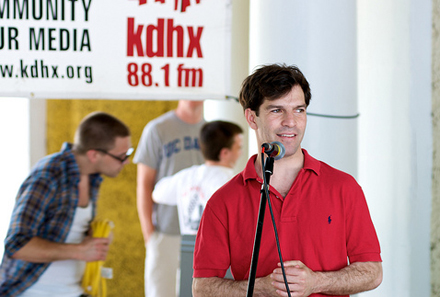
“Recovering Politician” Jeff Smith on the Political Divide

Jeff Smith, NSPE assistant professor of politics, discusses his views on the state of the electorate and the way going forward. Photo courtesy of Jeff Smith.
Following Representative Todd Akin’s controversial statement about “legitimate rape” in August, much of the media expected the Republican senate nominee from Missouri to give up his election bid. But Jeff Smith, assistant professor of politics at the Milano School for International Affairs, Management, and Urban Policy, knew better. Having served as a Democrat in the Missouri State Senate from 2006–2009, Smith is accustomed to Republican Party dominance in his home state—and understands why Akin’s extreme views could be an electoral advantage.
When teaching graduate students at The New School about the electoral and political system, Smith has more experience than time spent in the statehouse. As punishment for a minor campaign law infraction, Smith spent much of 2010 in federal prison, giving him a particularly personal understanding of the gray areas of campaign management and the legislative process. For Smith, Missouri is a perfect microcosm to discuss the widening divide between the left and the right at the national level.
“I think red states are getting redder and blue states are getting bluer,” says Smith, attributing this movement in part to increased mobility that accompanied the Interstate Highway System and inexpensive air travel. “People like to live near people who are like them,” explains Smith. “When travel is relatively affordable, conservatives can easily move from the coasts to the heartland, and liberals can move from the heartland to the coasts.”
Missouri’s changing demographics illustrate this phenomenon. “White flight” from the once-liberal stronghold of St. Louis resulted in larger conservative constituencies in ex-urban areas like St. Charles County. Cultural developments reflected this trend: Performances by big name country music stars such as Loretta Lynn in the 1980s and 1990s helped to establish the area as a retirement oasis for Christian conservatives. Elsewhere in the state, the population of conservative counties in south and southwest Missouri began to grow at a greater rate.
The use of new congressional district mapping software coincided with the demographic shift, making it easier to draw district boundaries—down to the city block—by party alignment. “This results in congressmen picking their voters instead of voters picking congressmen,” says Smith.
These two tendencies—the self-sorting of the population and the technological advances allowing districts to be tailored according to political behavior—give rise to a polarized Congress of politicians with little incentive to moderate their views or cooperate. When representing partisan constituents, a Congressperson’s surest way to lose an election is in a primary against a more extreme opponent. It’s hardly a foundation for productive political machine.
Will the chasm separating a politically polarized citizenry be bridged anytime soon? Or will partisanship steer the political machines into a traffic jam? Smith isn’t optimistic. “I think the gridlock is going to get worse before it gets better,” he says. “The country will need to reach a place where it is looking over at the abyss. We aren’t quite there yet.” For these reasons, Smith thinks Akin’s chances for reelection in November are good. Akin, and fringe politicians like him, gain ground in part because of the electoral system itself.
Read Smith’s article in The Atlantic about the ascendance of conservative Republicans in Missouri since the early 1990s here.
To hear from Jeff’s take on politics live, come to the October 11 panel discussion The Media and Politics: Election 2012, where he will be joined by international affairs professor Nina Khrushcheva, former Nation editor and publisher Victor Navasky and others. The discussion, which begins at 7:00 p.m. and takes place in Tishman Auditorium, is free and open to the public.